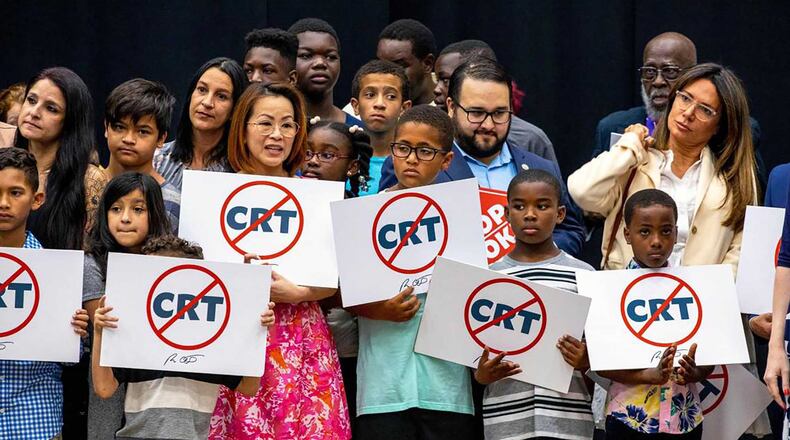Kimberly Allen is CEO of 904WARD, a civic group in Jacksonville, Florida, that promotes inclusion and combats racism.
In this guest column, Allen critiques Florida’s new “Stop WOKE Act,” which restricts race-based conversation and analysis in business and education. Though similar to Georgia’s new law banning the teaching of divisive concepts around issues of race and racism in public school K-12 classrooms, the Florida law also extends to college campuses. In addition, the Florida law limits how businesses can address structural racism, privilege and unconscious bias in their training and workplace policies.
The Florida law is facing multiple court challenges, including a federal suit by university professors and students alleging it violates their freedom of speech.
Last week, state attorneys tried to defend the law after a judge questioned whether Florida, under the pretense of stopping classroom indoctrination, was promoting its own brand of indoctrination. “We believe in academic freedom, so long as you say what we want you to say. That sounds like something George Orwell wrote,” said Chief U.S. District Judge Mark Walker.
By Kimberly Allen
America’s history around race, social justice, equity and equality is extensive, exhausting and paradoxical. As our country continues to develop and mature without a full and authentic recognition of our historical beginnings, we are plagued with the social unrest we are experiencing in today’s culture and politics.
This year, we have seen lawmakers exploit this unrest. The Georgia General Assembly passed House Bill 1084 to control how race is discussed in K-12 classrooms. Florida passed House Bill 7, commonly called the Stop WOKE Act. This bill drastically censors how education systems and businesses address workplace culture, curriculum and our country’s history with race and gender inequalities, threatening the freedom of speech guaranteed by the First Amendment of the Constitution.
Credit: Contributed
Credit: Contributed
These laws presume our children cannot handle learning the truth in an age-appropriate manner, that the information they will learn will make them hate our country. Therefore, we should reframe history to show that, by shear human nature, we can be rational and irrational, helpful and hurtful, loving and hating simultaneously, that each of us is capable of good and bad and, in fact, both coexist inside each of us.
It is important to recognize people do not hate our forefathers. We just do not all regard them as heroes. As brilliant as our first President George Washington was in his war tactics and helping establish a new country, he also rationalized the devaluing of Black lives through his ownership of enslaved Africans. He certainly believed in the idea that all people were created equal, but in his eyes, Black people were not technically people and notions of equality only extended to other white men like him.
Since that time, diverse groups have been fighting to truly realize and become part of “all people.” We have to be honest, though. The struggle of the various social justice movements and their successes go hand-in-hand — one not existing without the other. In fact, the very existence of these United States of America is because of the marriage between being oppressed and desiring freedom.
Whitewashing and censoring America’s history neither helps our children nor changes the past. Teaching accurate history in our schools helps contextualize the current conditions of our communities. Yes, we ought to teach the American Revolution, the U.S. Constitution and the civil rights movement. But children of all races must understand the impacts of Native American boarding schools, slavery, the Mexican American war, Japanese concentration camps, segregation, Jim Crow and redlining because all the stories are intricately intertwined.
Downplaying, altering, or omitting any one part jeopardizes the understanding of the bigger story. Omitting these lessons will delay the development of critical thinking and emotional intelligence, robbing our students of the opportunities to engage in dialogue that will help to advance our country. Removing these lessons will create intolerant and culturally naive children who will grow up to become adults comfortable with divided communities and ignorance. In other words, this legislation will create the very thing it is purporting to prevent — it will create the hatred that is dividing our country.
We must and should be able to have honest dialogue about the true history of America. We can acknowledge the monstrosities and the beauty — let’s not fall for the false choice. Our children can handle these conversations and so can the adults in the room.
So yes, George Washington was great and problematic, too. And yes, that’s OK.
About the Author
The Latest
Featured




